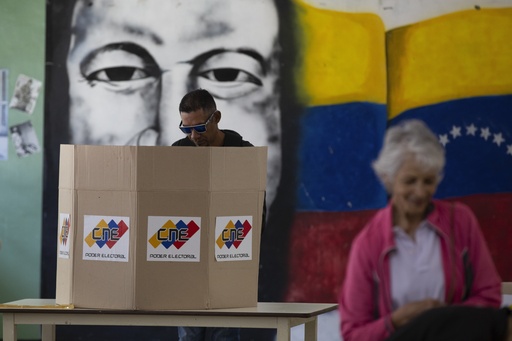CARACAS, Venezuela (AP) — Venezuela’s government faces its toughest electoral test in decades in a July 28 presidential election, which could give President Nicolas Maduro another six years in power or end the self-described socialist policies that once successfully boosted anti-poverty programs but whose sustained mismanagement later pushed the country into an ongoing economic crisis.
For years, opposition politicians boycotted elections they saw as rigged, but as the government’s popularity has ebbed former rivals have banded together in an attempt to change the government at the ballot box.
A turnout of millions in the opposition primary, polling and large political rallies suggest that the Unitary Platform coalition has significant support among voters. But it will have to overcome advantages that the ruling United Socialist Party of Venezuela has built into the system, ranging from limits on opposition campaigning to tight government control over the election process. On top of that, many doubt the votes will be counted fairly.
Here’s a look at how Venezuela votes.
Is the election fair?
Maduro’s government promised to allow opposition leaders to compete in the election, but it continues to lean hard on the scales, including declaring the opposition’s primary illegal and blocking its most popular leader from the ballot.
European Union observers called recent regional elections “the most balanced in 20 years,” but said pro-government candidates enjoyed advantages like state funding and preferential access to gasoline, easing their campaigns amid widespread shortages. Like in previous elections, ruling-party organizers also doled out food and other state-controlled benefits in return for votes at checkpoints located near polling places.
Electoral authorities rescinded the EU’s invitation to observe the upcoming vote in late May, citing economic sanctions imposed by the 27-nation bloc.
The ruling party also wields tight control over the voting system, with loyalists in charge of the National Electoral Council. Many polling places are spread thin, making it harder for the opposition to monitor them. About a third of registered voters in this election are assigned to polling places with only one or two voting machines.
The ruling party has traditionally obtained the bulk of its vote in these smaller polling places, and for this election, the electoral council added 1,700 single-machine centers. Reports of ruling-party efforts to coerce and control voting during previous elections have mostly been associated with these one- and two-machine vote centers.
How does voting work?
The number of eligible voters in the country is estimated to be around 17 million.
Another 4 million Venezuelans living abroad are registered to vote, but only about 69,000 have met the criteria to cast ballots overseas. Costly and time-consuming government prerequisites to register, lack of information and a mandatory proof of legal residency in a host country kept many migrants from signing up to vote. Venezuelans in the U.S. have no way to vote, as the country’s consulates in the U.S. have been shuttered since the countries broke diplomatic relations in 2018.
Almost all polling places are at public schools, which will be guarded by members of the military on Election Day.
Venezuelans vote using electronic machines, which record votes and also provide a paper receipt. These receipts are supposed to be deposited in ballot boxes inside the polling place, but ruling party officials have previously coerced voters to sneak them out to provide evidence of their support.
Will the vote be counted fairly?
Trust in the system has been affected by vote tampering claims, leading many voters to assume that even if the most votes do go against Maduro, there’s no guarantees the government will accept — or even admit to — that outcome.
None of those fraud claims have been proven by an independent third party.
After a December referendum, the government said that over 10 million voters had given it overwhelming support, claiming a huge turnout figure despite widespread reports of empty polling places. The electoral council never released the paper vote tallies produced by voting machines.
In 2017, the international software company that had provided voting technology to Venezuela for more than a decade said that turnout figures were likely manipulated in a major legislative election. The company, Smartmatic, reported that the official turnout announced by electoral authorities was off by at least 1 million. Since then, the government has switched to using new voting machines designed domestically.
Still, opposition leaders hope that if they can win a significant majority of votes cast, allies of the government will choose to stand aside. This could depend, experts say, on factors like how big a margin the opposition wins, pressure and concessions from the international community, and whether international powers like the U.S. offer Maduro an exit strategy he’s willing to accept.
Source: post





